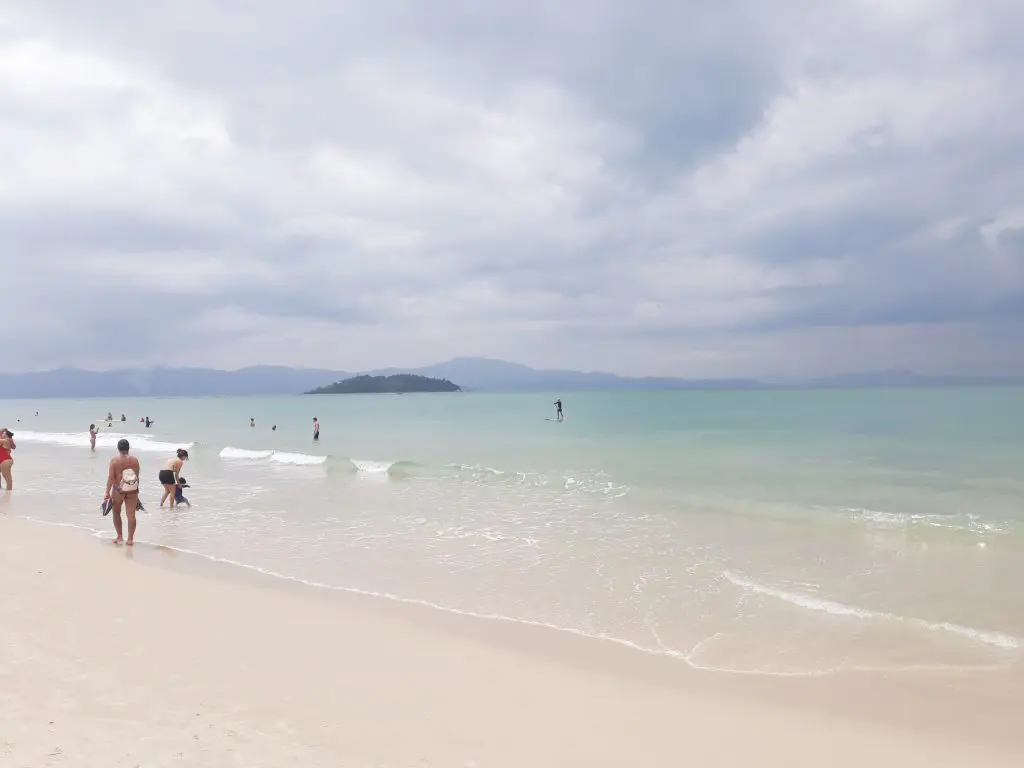What’s the best country in the Balkans for expats?
It’s not the cheapest one.
And it’s definitely not the one with the best quality of life.
We’ve guided hundreds like you to move to Europe. Their biggest mistake? Picking a beautiful country with low prices. A year later, inflation is eating their savings, and they are fighting with immigration.
The best country is actually the most predictable.
I analyzed all 10 Balkan states to find the safest bets and ranked them from worst to best using data that cuts through the noise. We will focus on what matters for your long-term security and your money: easy visas, international-level healthcare, and tax systems that protect your retirement assets. In addition to these critical factors, it’s essential to consider the pros and cons of living in the Balkans, as personal experiences can vary widely. Each country offers its unique charm and challenges, from cultural richness to bureaucratic hurdles. By evaluating both the benefits and drawbacks, you can make a more informed decision about where to settle for a secure and fulfilling life.
The two countries you might think are the best in the Balkans are actually some of the worst for expats. I’m serious.
So let’s find out which country is a safe bet and which one is just a trap.
The Criteria To Define The Best Countries in the Balkans for Expats
We focused on five critical pillars. Each of these pillars is weighted equally, at 20% of the total score.
A cheap country with impossible visas is a trap. A country with great healthcare but no infrastructure is a prison.
The first pillar is Cost of Living. We look at the hard numbers that will affect your monthly budget.
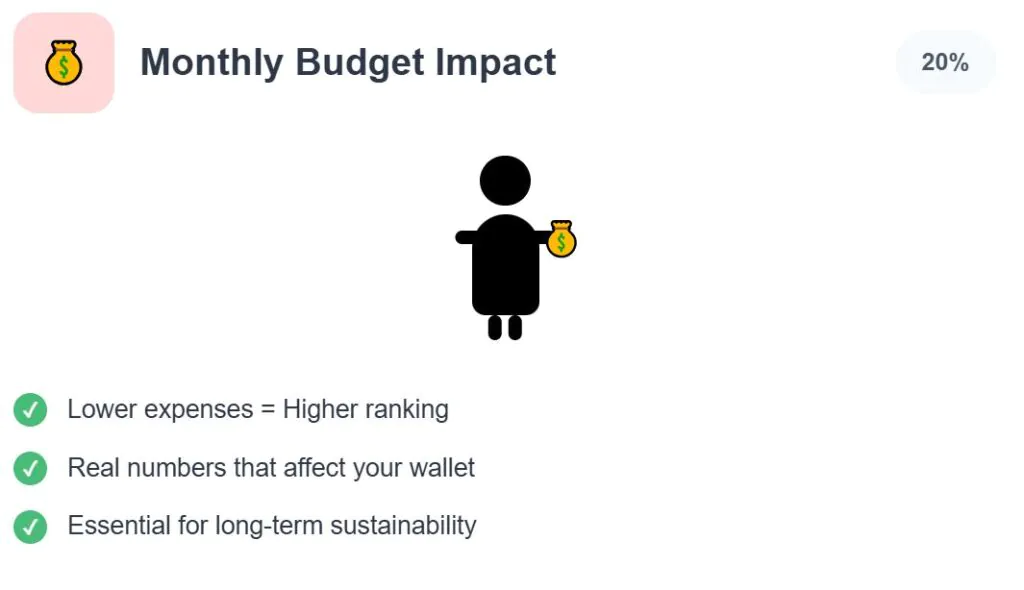
The next is Private Healthcare. Public healthcare in the Balkans is not an option for many expats. Therefore, our analysis focuses on private healthcare. A country scores higher for having affordable, high-quality, and accessible private medical services.
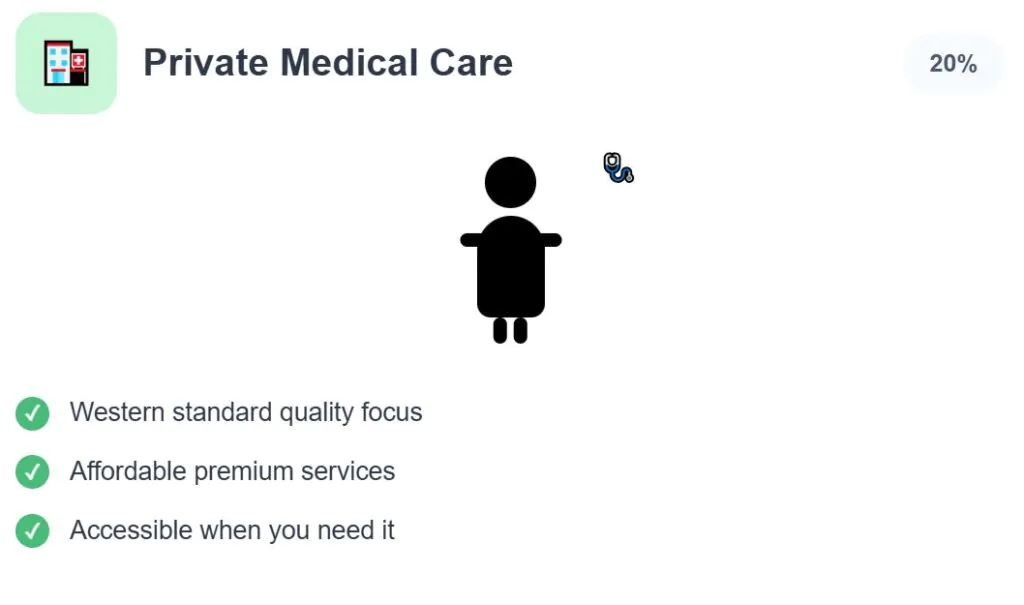
The third pillar is Infrastructure & Connectivity — how easily you can live a modern, connected life and travel. Slow internet, limited flight options, and poor roads mean isolation and frustration.
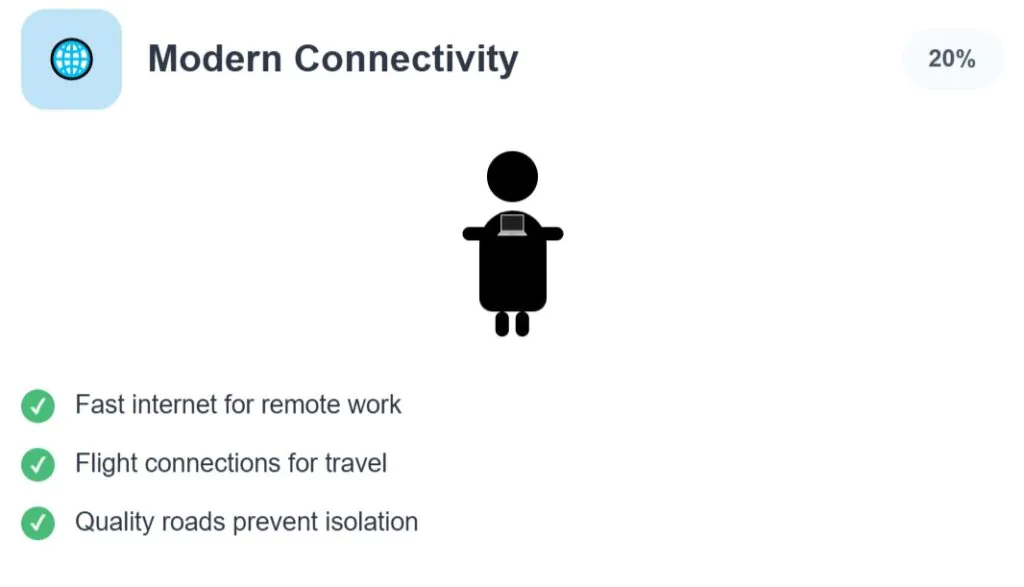
The next is Residency & Visa Ease. Here we measure the difficulty of obtaining a long-term residency permit for a non-EU citizen. A high score means a clear, fast, and straightforward path to legal residency.
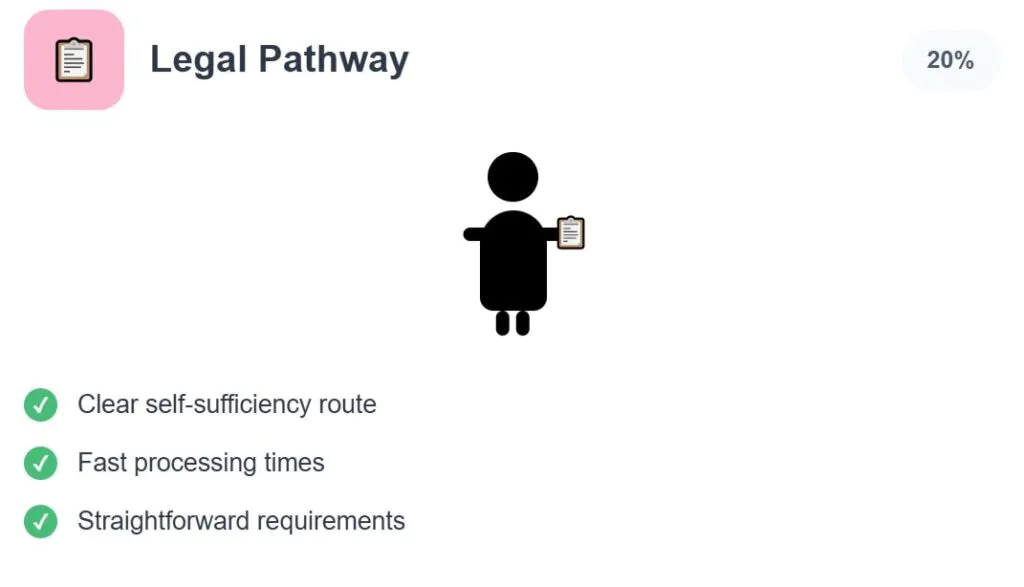
The fifth is Language Accessibility. This metric assesses your ability to navigate daily life without being fluent in the local language. Our score is derived from the percentage of the population, particularly in urban areas, that speaks English to a conversational level.
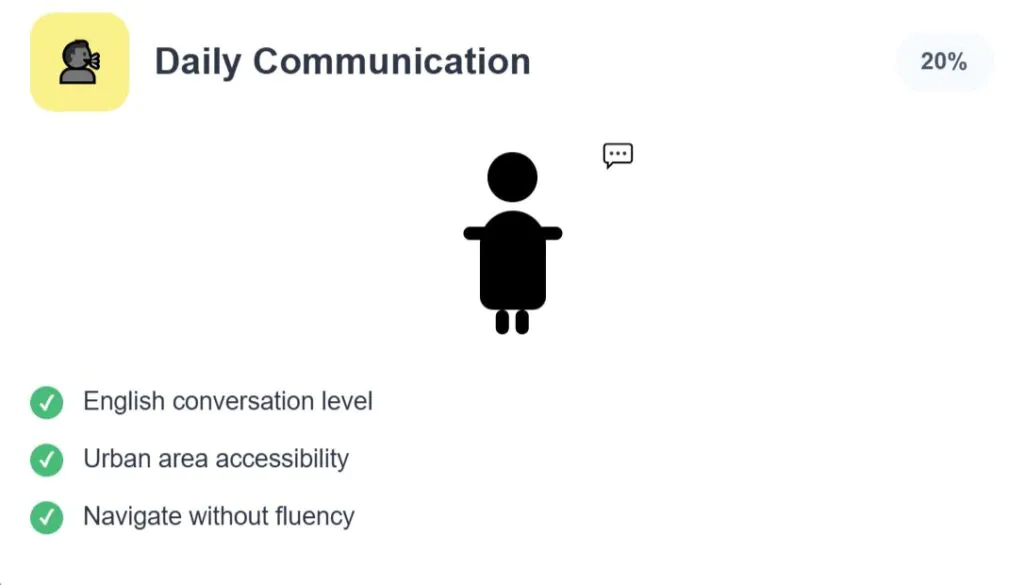
10th Place: Kosovo
Kosovo looks cheap and uses the euro. That attracts some people.
But when we test it against long-term residency, healthcare access, and real infrastructure, the costs reappear as risk.
Residency permit processes still have an uncertain framework. Kosovo is a very young state and some rules are still informal. That produced the lowest Residency Ease score in our dataset: 1.0 out of 10. This uncertainty affects leases, banking, and insurance eligibility.
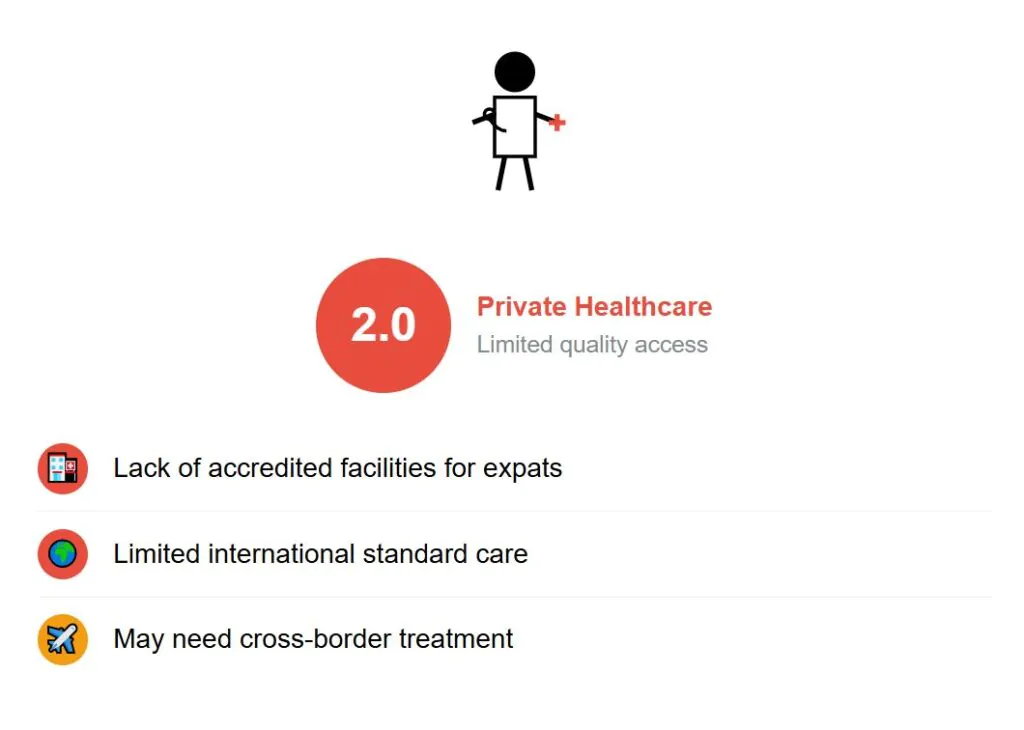
Healthcare is the second major gap. Private systems lack verifiable, accredited facilities for US expats. The Private Healthcare score is 2.0. For anything more serious, you may need to seek care across the border.
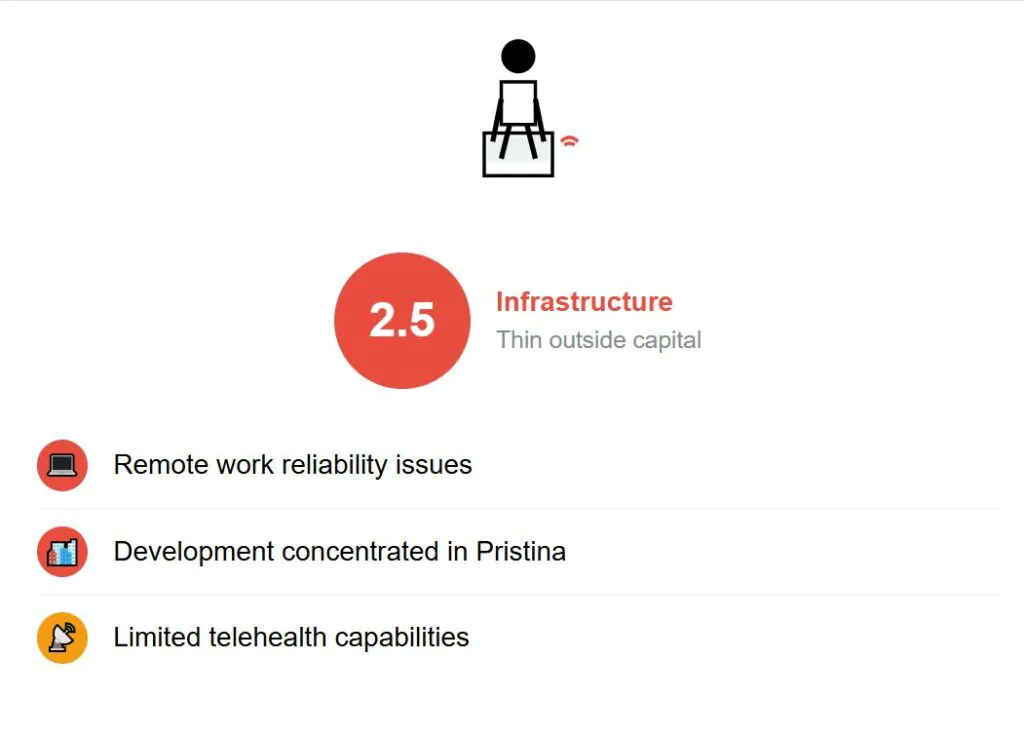
Infrastructure remains thin once you leave Pristina. The score for this factor is 2.5. Concentration in one city creates single‑point failure — if the roads to the capital are blocked, you have a problem.
Regarding language barriers, in Pristina around half of the younger population speaks English, but outside the capital the numbers are likely much smaller.
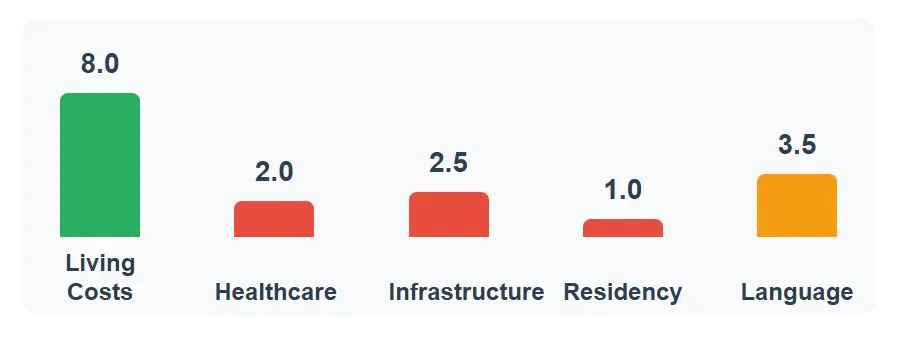
The good side: the Cost of Living score is 8.0, and euro usage helps with currency convenience. That creates a paradox: easy day‑to‑day spending, but regulatory uncertainty and exposure to external pressures.
Volatility and severe data limitations across pillars push hidden costs onto you — legal fees, visa runs, medical travel, and insurance denials are the real bill.
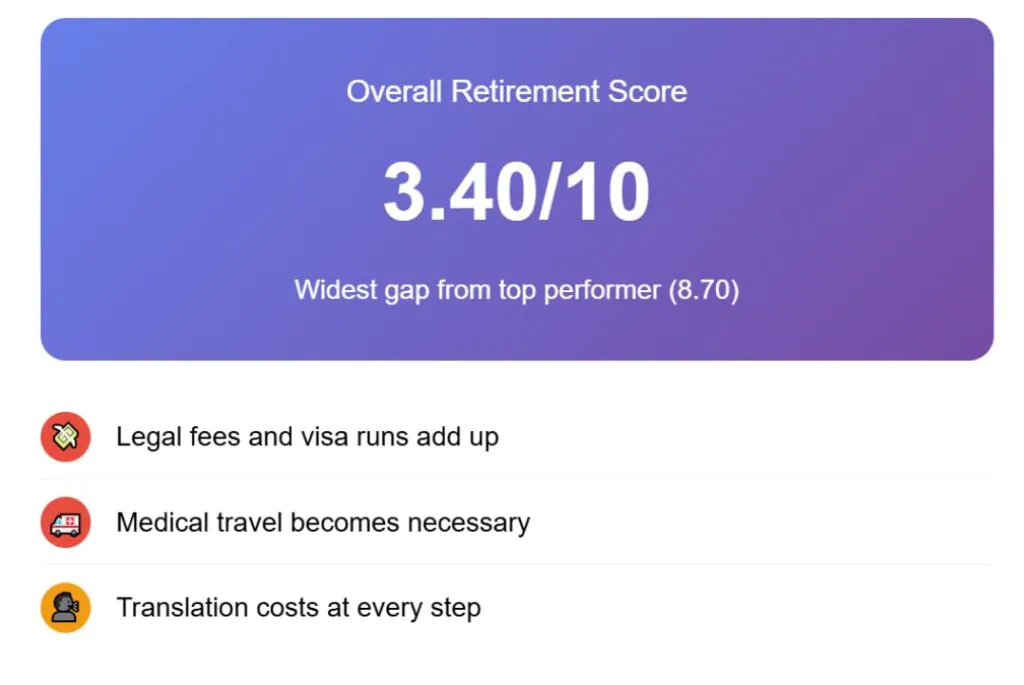
Final scores for Kosovo:
Cost of Living 8.0, Private Healthcare 2.0, Infrastructure 2.5, Residency Ease 1.0, Language 3.5, for a weighted total of 3.40 out of 10.
But amid these massive structural problems, there is a significant positive point about Kosovo: they are some of the most American-friendly people in the world. In Europe, only Albania is as US-friendly as Kosovo.
PS: I have some really good news: FREE FOR A LIMITED TIME: Grab your Expat Wealth & Lifestyle Compass ($108 value) today! Includes our 74-page guide of Affordable European Cities, our Zero-Tax countries report, and our expat checklist. http://patreon.com/The_ExpatJoin us here before this offer ends.
9th Place: Bosnia and Herzegovina
Bosnia and Herzegovina looks affordable, but predictability isn’t there — and we will not even mention the possibility of the country being split.
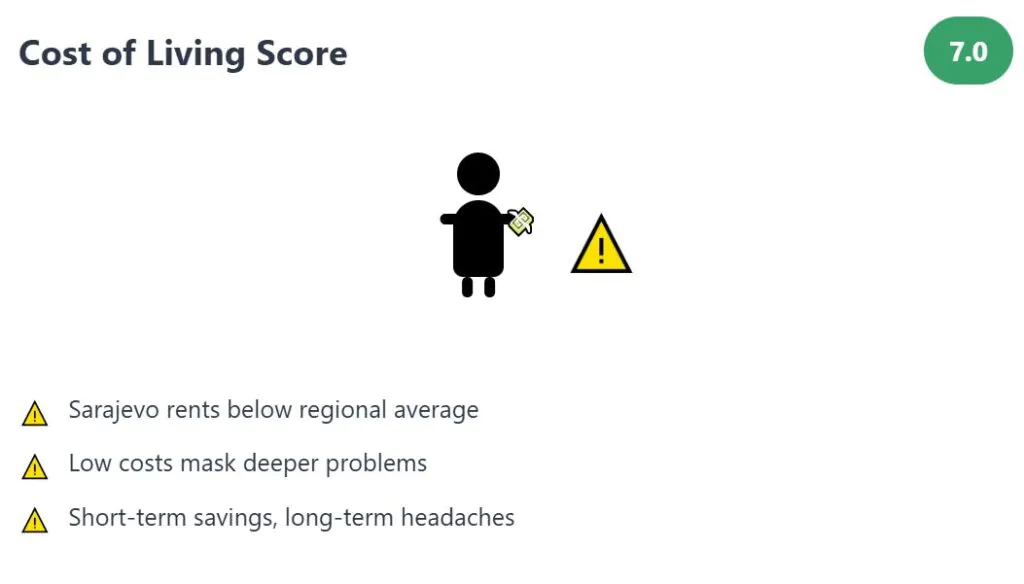
The cost side helps at the start. In Sarajevo, the capital and considered expensive by Bosnian standards, you can find many apartments for less than US$480. That gives a Cost of Living score of 7.0. If you optimize for rent alone, it reads like a win.
But the long-term pillars pull it down fast. The bureaucracy to obtain residency is the first constraint. The complexity results in a low Residency Ease score of 3.0.
Healthcare is the bigger risk. Here is what a local told us:
“Almost everything is owned by the state. They take money from your paycheck every month. If you don’t die from disease, you have high chances to die from our healthcare.”
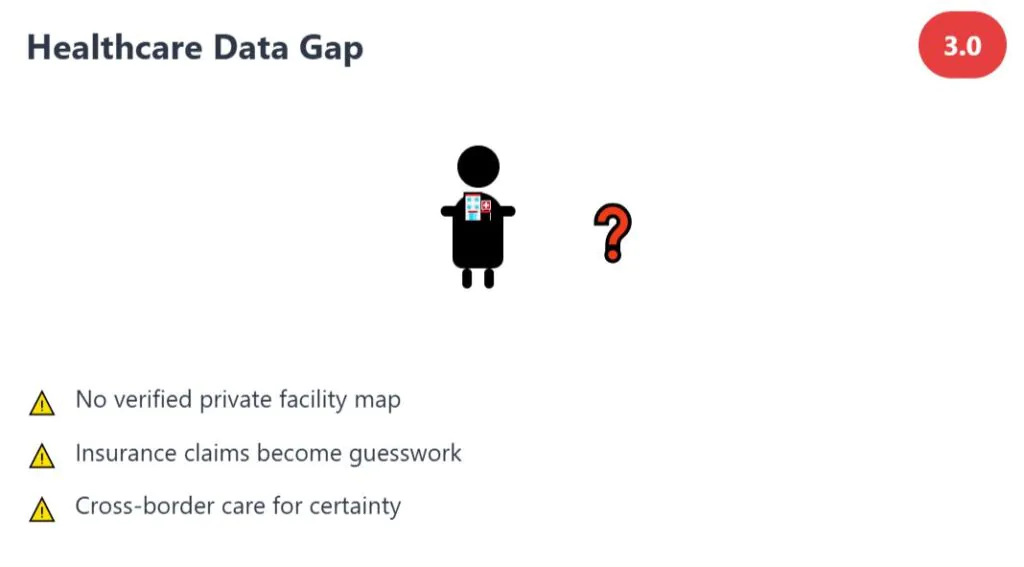
Private Healthcare score is just 3.0.
Infrastructure lands in the middle at 5.0. Improvements exist, yet still subpar for European standards. Sarajevo airport connects the capital to some European capitals, and also to the Middle East.
Language Access score is 4.5, meaning moderate English proficiency. You can function in parts of Sarajevo, but if you need to contact public employees, it might be complicated.
Of course, you can always learn Serbo-Croatian and then you would be able to communicate in almost half of all the 10 countries of this ranking. It might look challenging, but as someone who learned a Slavic language from scratch, I guarantee it is also a lot of fun (and for that I used Lingq).
Sarajevo has better infrastructure than the rest of the country, but centralization also creates single‑point dependency: if the capital’s offices bottleneck, everything waits.
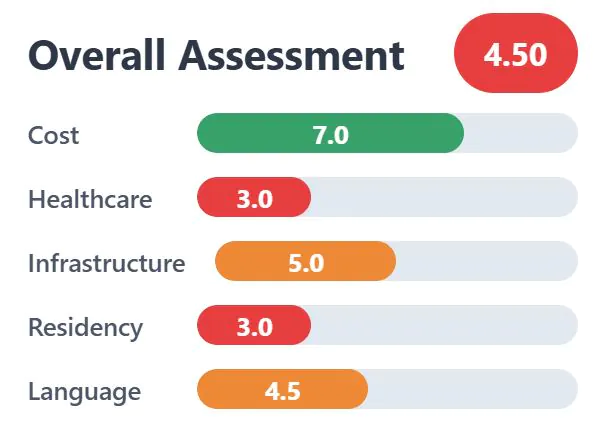
Scores for Bosnia & Herzegovina:
Cost of Living 7.0, Private Healthcare 3.0, Infrastructure 5.0, Residency Ease 3.0, Language 4.5, for a weighted total of 4.50.
That places Bosnia and Herzegovina in ninth.
8th Place: Croatia
Croatia draws retirees with a good quality of life and stability.
But that comes at a price.
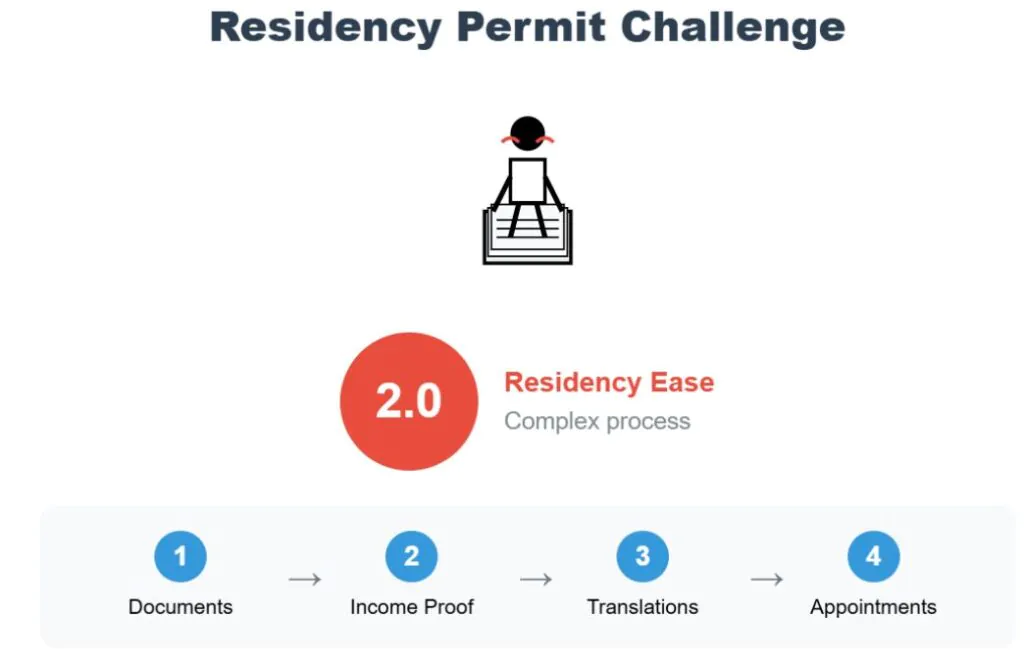
First, to obtain residency there is more difficult. For long-term life, you need temporary residence based on financial independence. That process is hard. It demands extensive documents, strict checks, and income proof that likely exceeds €1,000 per month. So for residence easiness, Croatia gets a 2.0.
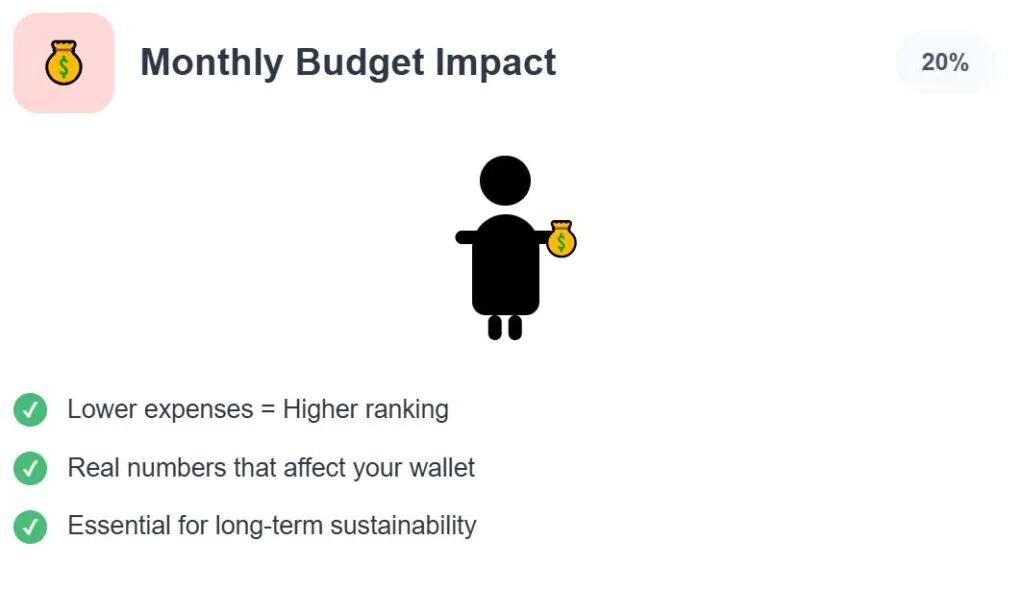
Another obstacle is that Croatia has become expensive. EU and Eurozone integration push expenses above the regional average. One-bed units in Zagreb and coastal hubs might go close to €1,000 per month.
Healthcare is a strong point. Accredited private facilities are present in Croatia and rank among the best in the region. That raises confidence for international private medical insurance approvals and planned procedures.
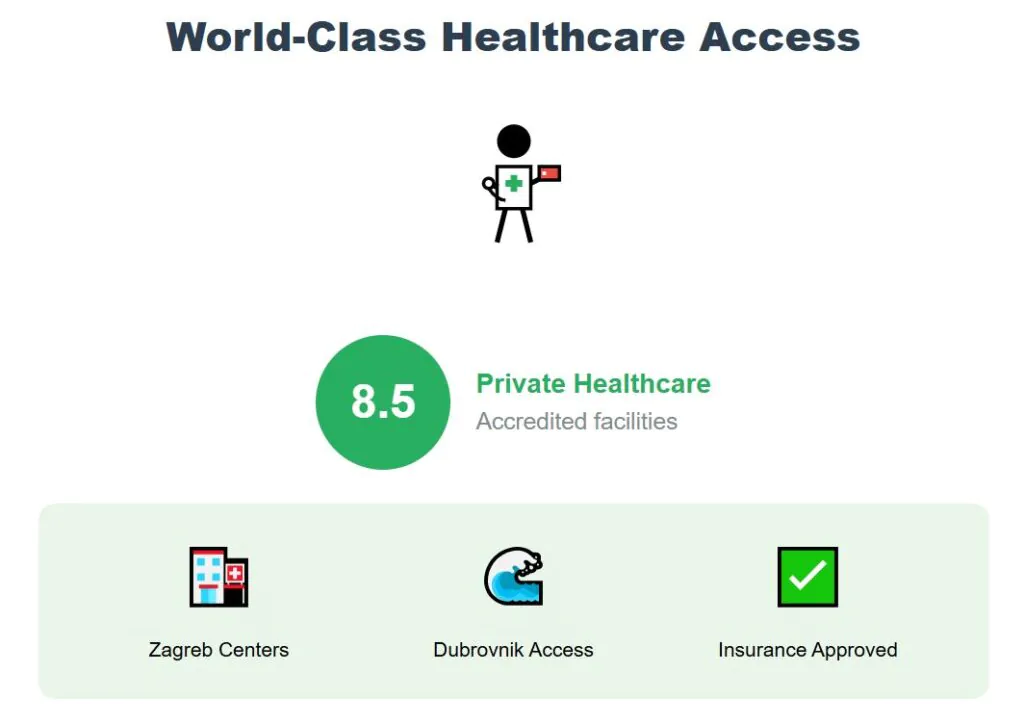
Infrastructure is also robust. Year-round air routes are expanding, including a coastal route converting to year-round operations, connecting airports like Zagreb or Split to the entire world. That gives you winter flights, fewer seasonal gaps, and better access for travelling to visit your family and friends.
Due to its huge tourism industry, it is not uncommon in Croatia — especially in the larger cities and coastal areas — to find English speakers, so the language barrier is not that bad.
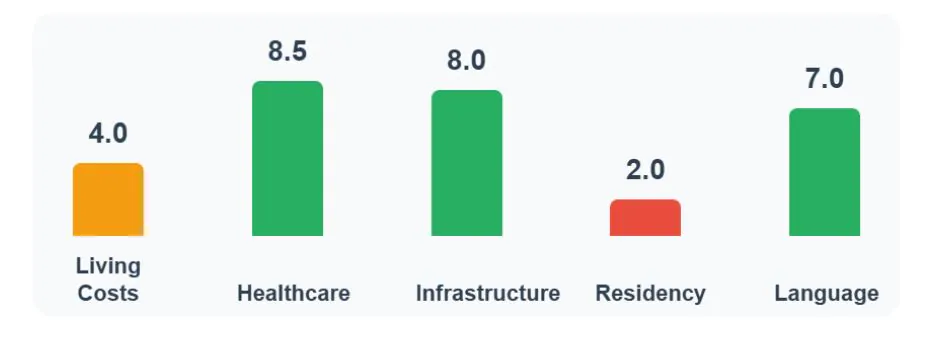
The weighted scores tell the story:
Cost of Living 4.0, Private Healthcare 8.5, Infrastructure 8.0, Residency Ease 2.0, Language 7.0.
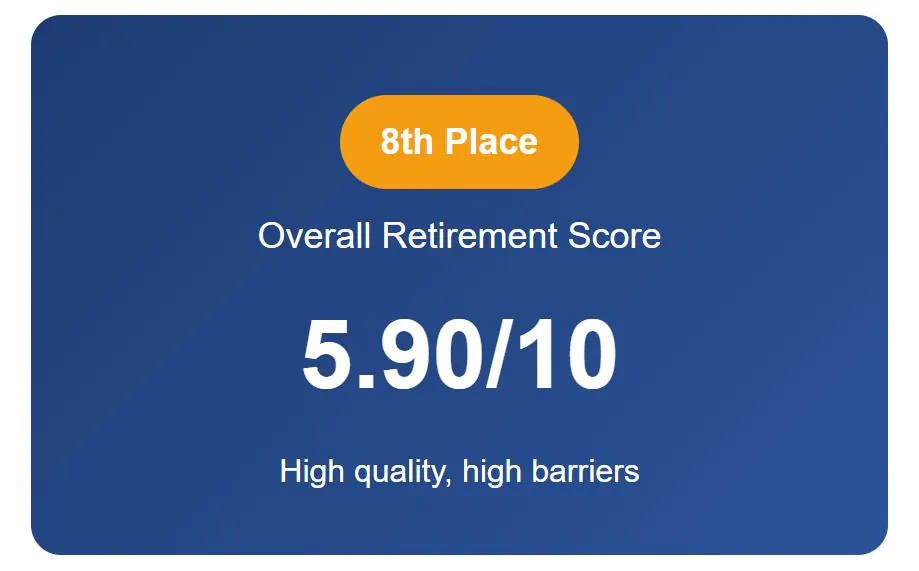
The overall is 5.90 out of 10. Croatia ranks eighth because it got very expensive, and it is much harder to obtain a residence permit.
7th Place: Albania
Albania is a place where a one-year visa-free stay sounds perfect — until year two.
That grace period helps you test costs and neighborhoods without paperwork. But the pathway for year two isn’t built for retirees with clear rules and timelines.
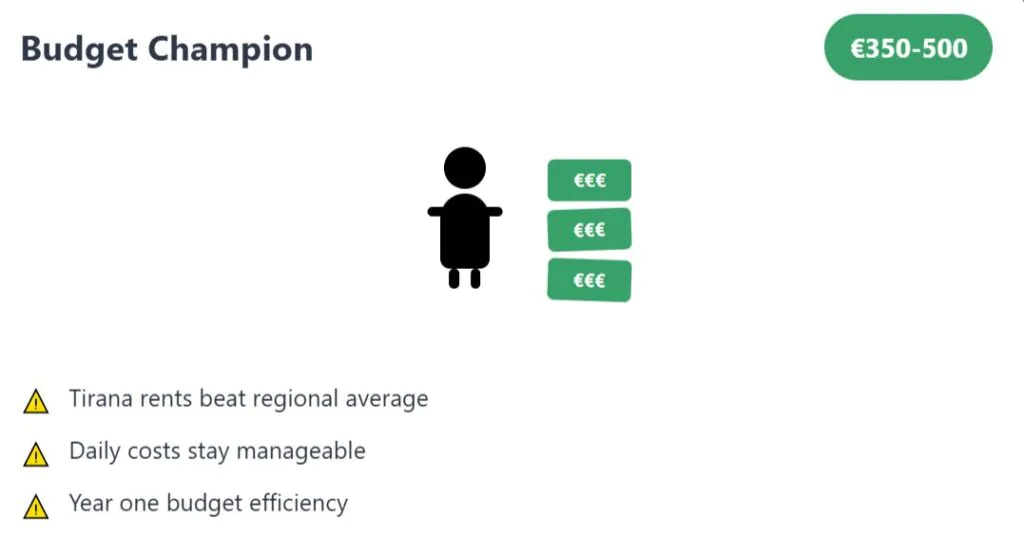
Albania wins on low prices. Two-bedroom apartments in Tirana or in coastal cities like Durres average €350 to €500 per month. Daily expenses are also remarkably cheaper.
Now the trade-offs. Fixed broadband ranks 84th globally as of September 2025. It has the second-lowest average speed in Europe, just above Turkey. Outside Tirana, infrastructure thins, so reliability drops when you move to coastal or rural areas.
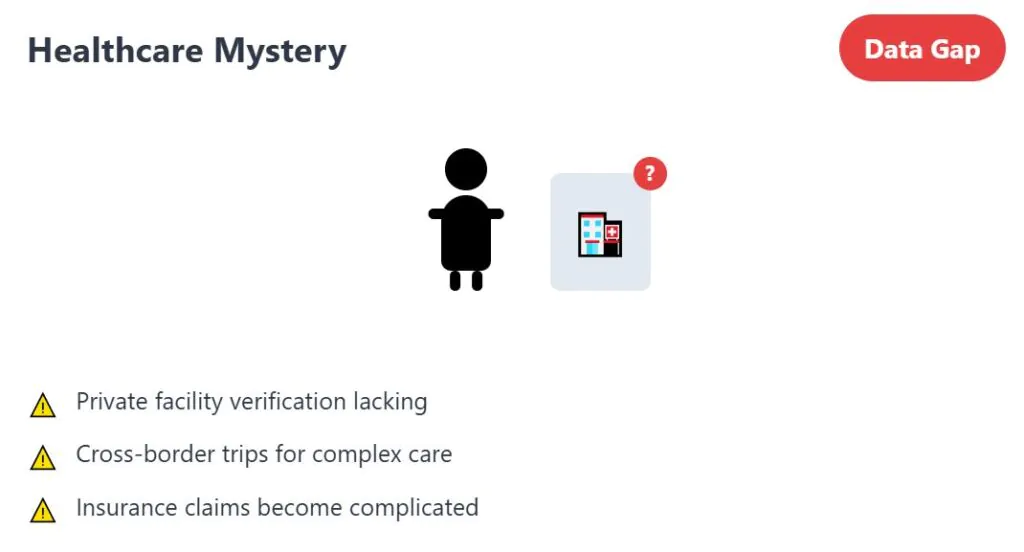
Healthcare validation is the bigger unknown. If you need complex care or specialist follow-ups, cross‑border travel becomes part of your plan. If you want better infrastructure, better choose options in the capital, which narrows your housing choice.
Language access stays moderate. The EF EPI score of 533 is reasonable, and means English appears in urban centers and professional settings. Still, sometimes you will need an Albanian translator.
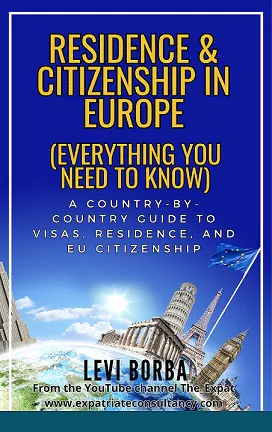
Back to the visa question: the one-year visa-free entry gives you a soft landing. After that, you will need to apply for a residence permit, which will require some paperwork.
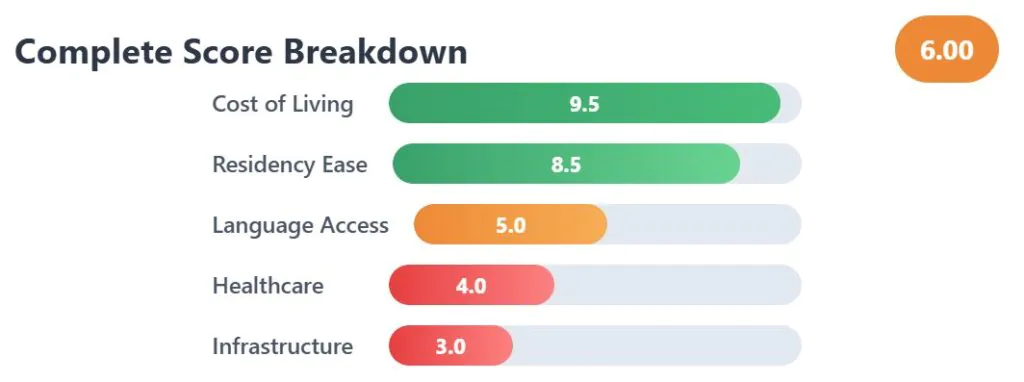
Albania’s weighted total score is 6.00. In the components, costs are strong, visa ease is middling after year one, infrastructure lags on fixed broadband, healthcare validation is weak, and language is moderate.
You save a lot on rent and daily spend, but you trade predictability and system depth.
Next comes a high-quality-of-living country where EU rules make it a bit more complicated to reach.
6th Place: Slovenia
Slovenia delivers the best quality of life in all the Balkans, but it is not free of barriers.
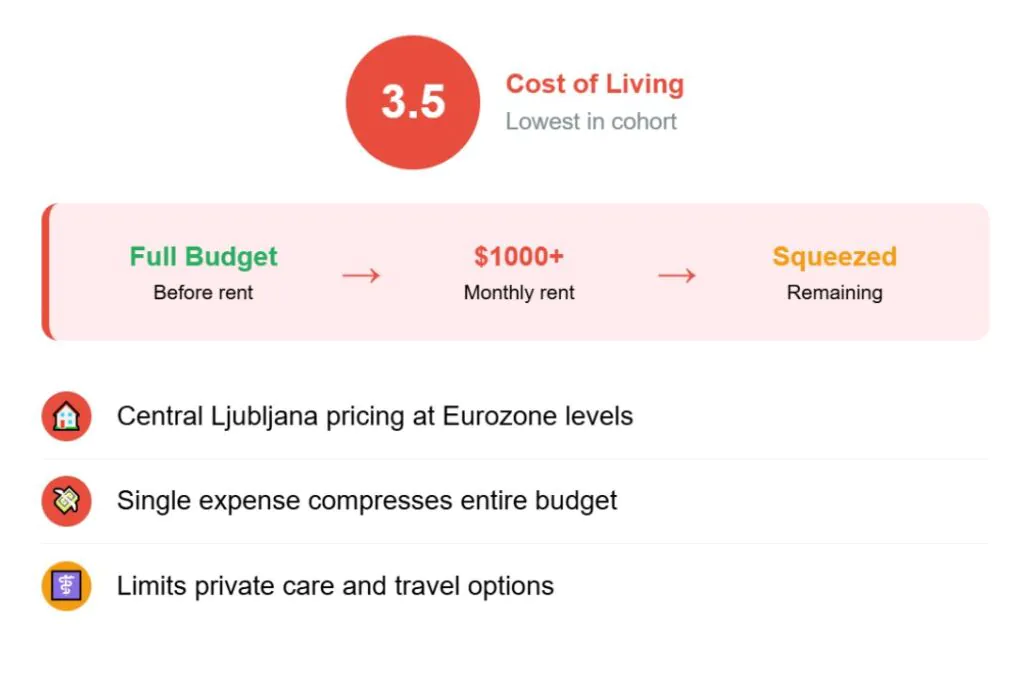
Cost pushes you away first. The Cost of Living score is 3.5 out of 10, the lowest in the cohort. Ljubljana’s pricing tracks the Eurozone. Quality one-bedroom units in central areas tend to approach or exceed US$1,000 per month.
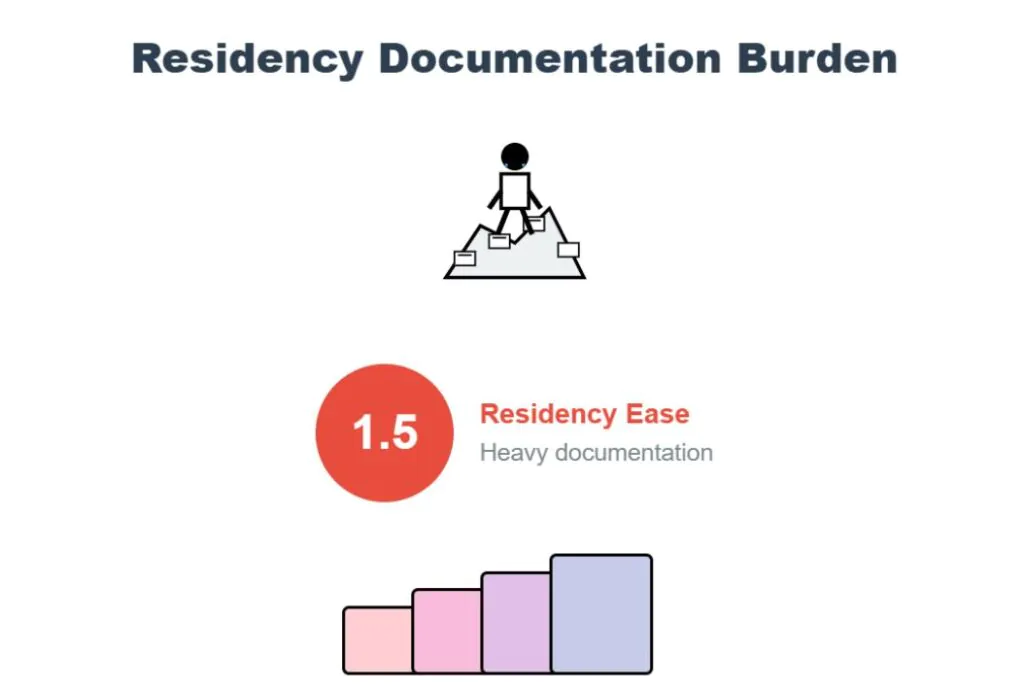
Residency is another barrier. Slovenia enforces strict long-stay rules. The temporary residence route for financially independent people is known for heavy documentation and high proof of means. Our Residency Ease score reflects it: 1.5 out of 10.
Healthcare and infrastructure are strong and help in daily life. Private Healthcare scores 9.0 out of 10 and Infrastructure gets 8.5. There are accredited private options and reliable connectivity that support specialist visits and routine logistics.
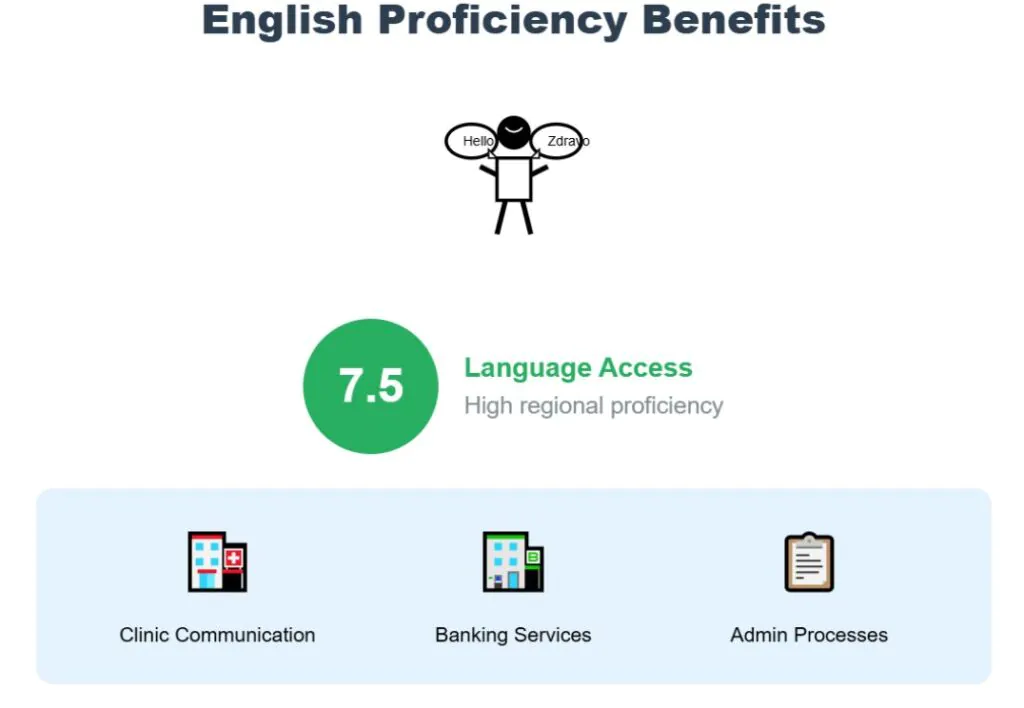
The Language Access score is 7.5 out of 10, which means high English proficiency by regional standards. Even so, the high proportion of English speakers is not enough to offset the high rents and everyday prices.
High cost of living erodes the budget. Residency rules create a narrow legal corridor.
Slovenia’s scores from the research:
Cost of Living 3.5, Private Healthcare 9.0, Infrastructure 8.5, Residency Ease 1.5, Language 7.5, for a weighted total of 6.00 out of 10.
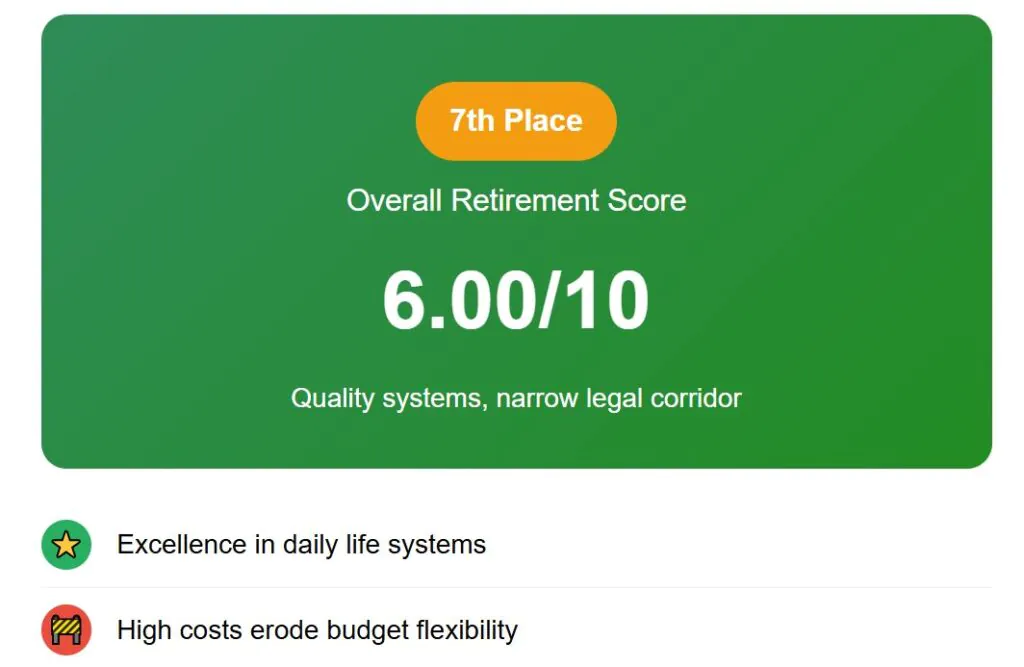
That places Slovenia in the 6th position.
5th Place: Montenegro
Montenegro rewards owners.
You buy a property — any value — and you unlock a temporary residence you can renew each year. You don’t need to prove a high monthly income or tie your status to a job. Property ownership there is the simpler path to legal certainty.
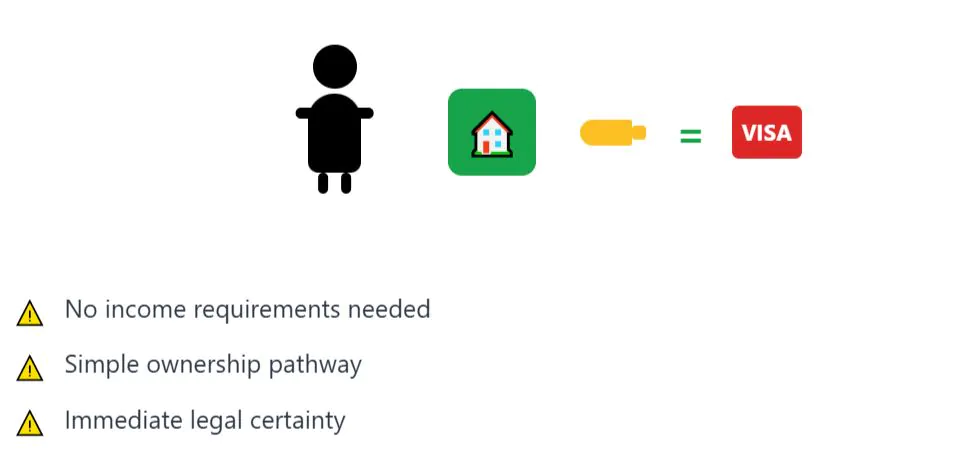
The investment may not be the lowest on day one, but the risk is capped, and that stability compounds.
Costs are relatively low. The Cost of Living score is 6.5.
The Private Healthcare score is 5.0 due to limited verified data on accredited providers.
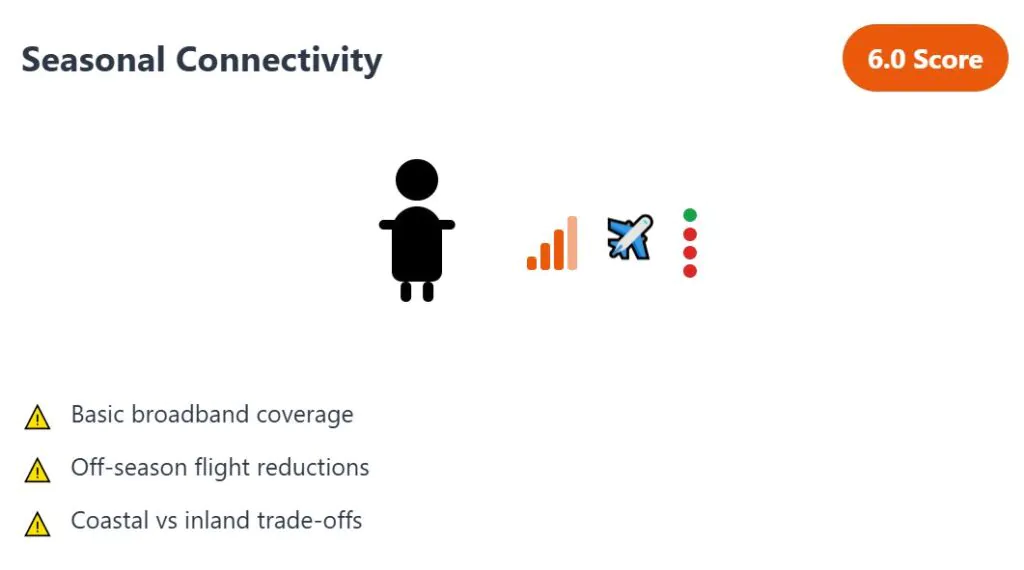
The Infrastructure score is a moderate 6.0. Seasonality in air connectivity adds friction. Off-season routes shrink, which can slow family visits and medical trips.
If you choose coastal towns like Kotor or Budva, factor in peak-season prices and extra travel time to administrative or specialist centers in Podgorica.
The language barrier is workable but not seamless, and Language Access scores 5.5.
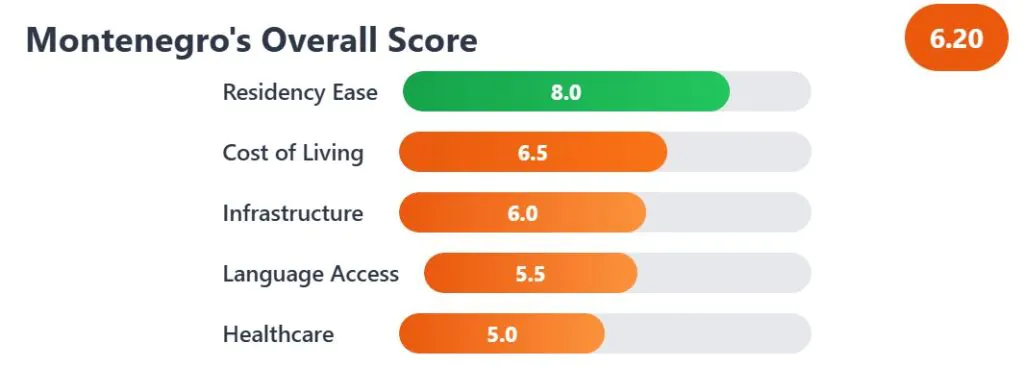
Scores for Montenegro:
Cost of Living 6.5, Private Healthcare 5.0, Infrastructure 6.0, Residency Ease 8.0, Language 5.5, for a weighted total of 6.20.
4th Place: North Macedonia
North Macedonia lands here because two pillars carry the weight: private healthcare and cost. You get affordability with decent medical infrastructure.
There is a private hospital in Skopje accredited to American standards and recognized as a regional center of excellence.
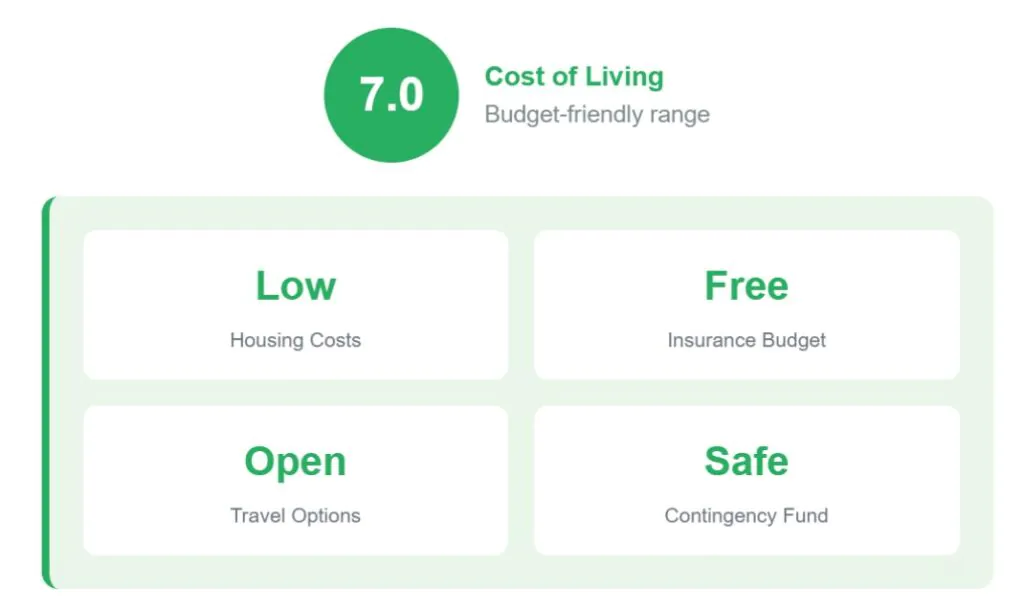
The Cost of Living score gets a 7.0. Skopje rents trend low by regional standards, with two-bedroom pricing in a budget-friendly range.
Infrastructure is the trade-off. We score it at 5.5. Connectivity and services work in the capital, but coverage thins outside. If you want a rural base, you add travel time for appointments, diagnostics, and admin.
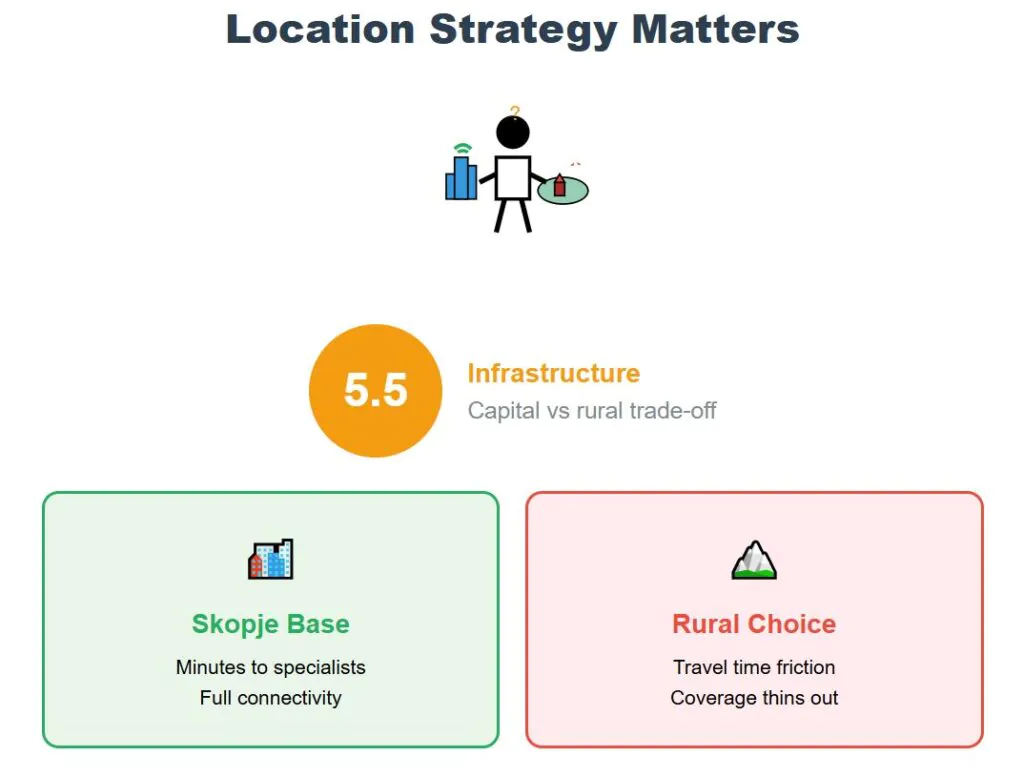
The bureaucracy to obtain a residence permit is not frictionless. There are possibilities to obtain a residence permit, yet none are specific for expat retirees. The Residency Ease score is 5.0.
Language access is workable and gets a 6.0.
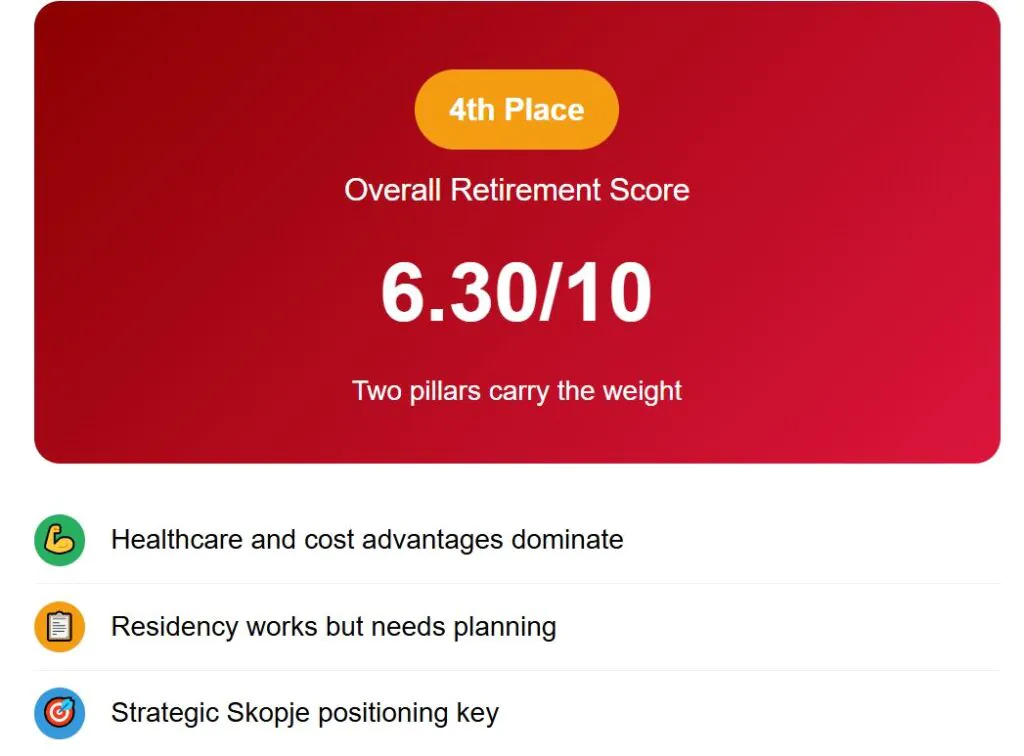
Final scores: Cost of Living 7.0, Private Healthcare 8.0, Infrastructure 5.5, Residency Ease 5.0, Language 6.0. The weighted total is 6.30 out of 10, which places North Macedonia fourth.
3rd Place: Serbia
Serbia earns this spot because it balances cost, access, and predictability without forcing you through extreme paperwork.
You get a workable entry via the passive income route. For the initial application, you show at least €1,500 in a local bank account. That gives retirees a clear doorway without employment or large investments. Once you’re in, you can plan renewals with fewer surprises than many neighbors.
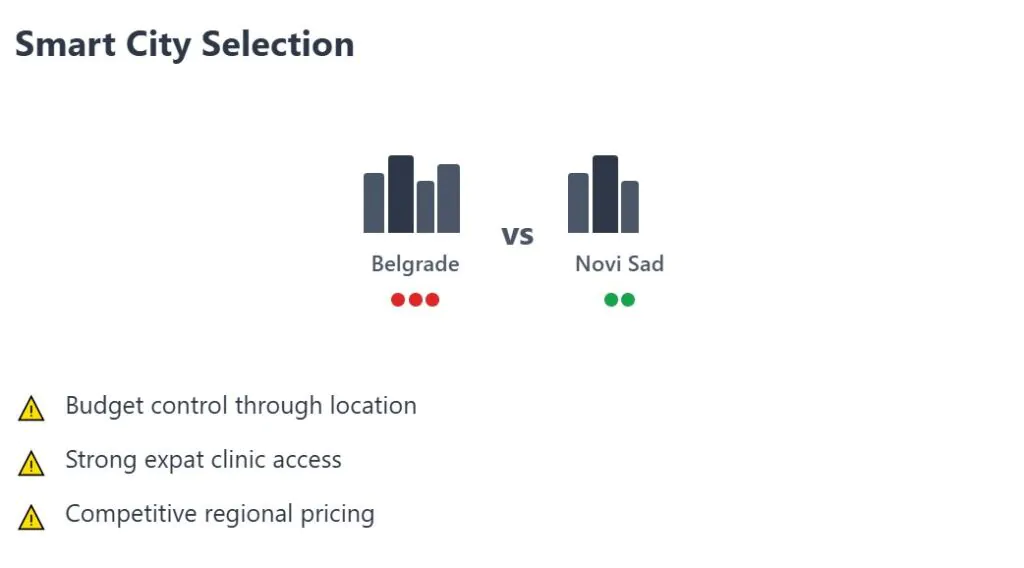
The cost of living in general is low — actually very low for European standards. While Belgrade is not an expensive capital when compared to other capitals, it is expensive when compared to other cities in Serbia, which are often much cheaper. Novi Sad, for example, trims costs a bit while keeping access to good infrastructure and medical services.
Digital infrastructure is decent. Average internet speed hits 86 Mbps. Road quality and power reliability are not at top EU levels, so the final Infrastructure number lands at 7.0.
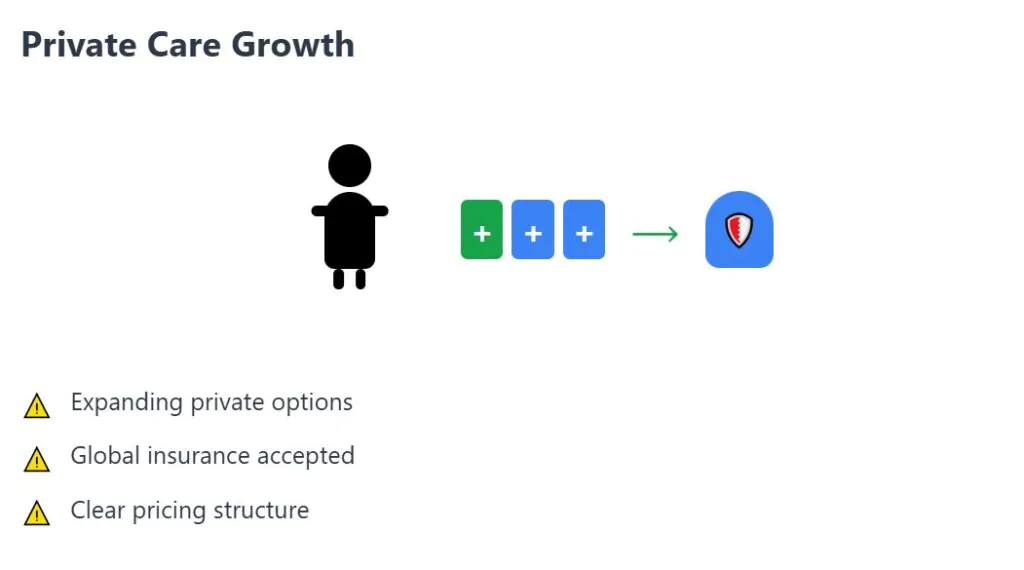
Healthcare in Serbia, especially in the private sector, is moving in the right direction. The public system has limits, but the private market offsets it: diagnostics, specialist consults, and planned procedures with clear pricing and faster scheduling. Private Healthcare gets a 7.0, reflecting growing options and workable insurance integration.
Language Access earns 8.5. In large cities, many people speak English. Connectivity for travel supports the plan. Belgrade’s year-round air connections simplify family visits and holidays.
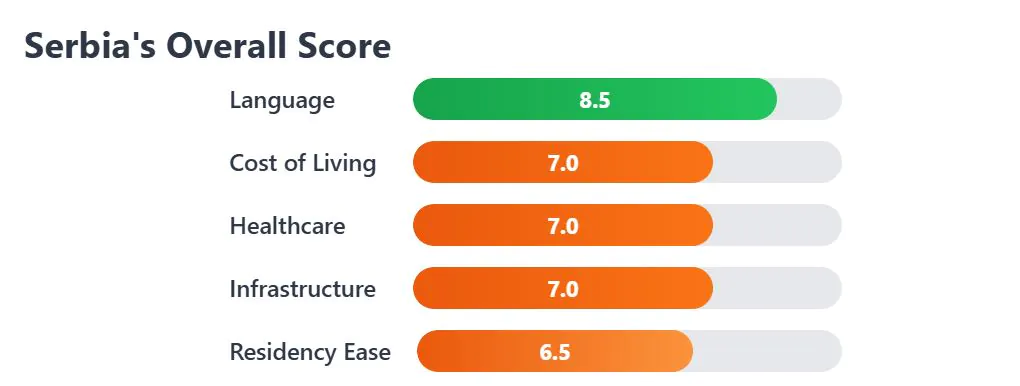
Scores for Serbia:
Cost of Living 7.0, Private Healthcare 7.0, Infrastructure 7.0, Residency Ease 6.5, Language 8.5. The weighted total is 7.20 out of 10.
That puts Serbia in third. If you want a clear residency path, workable costs, and dependable connectivity, Serbia checks those boxes.
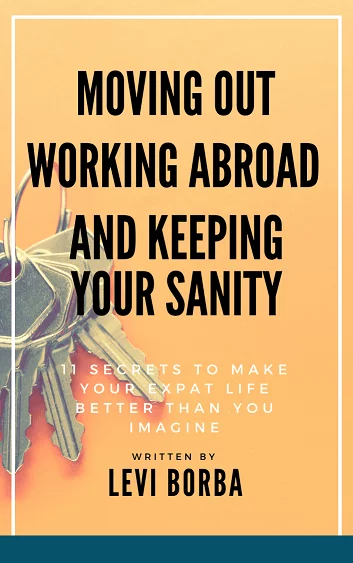
2nd Place: Romania
Romania ranks second because the numbers align across visas, care, language, and cost.
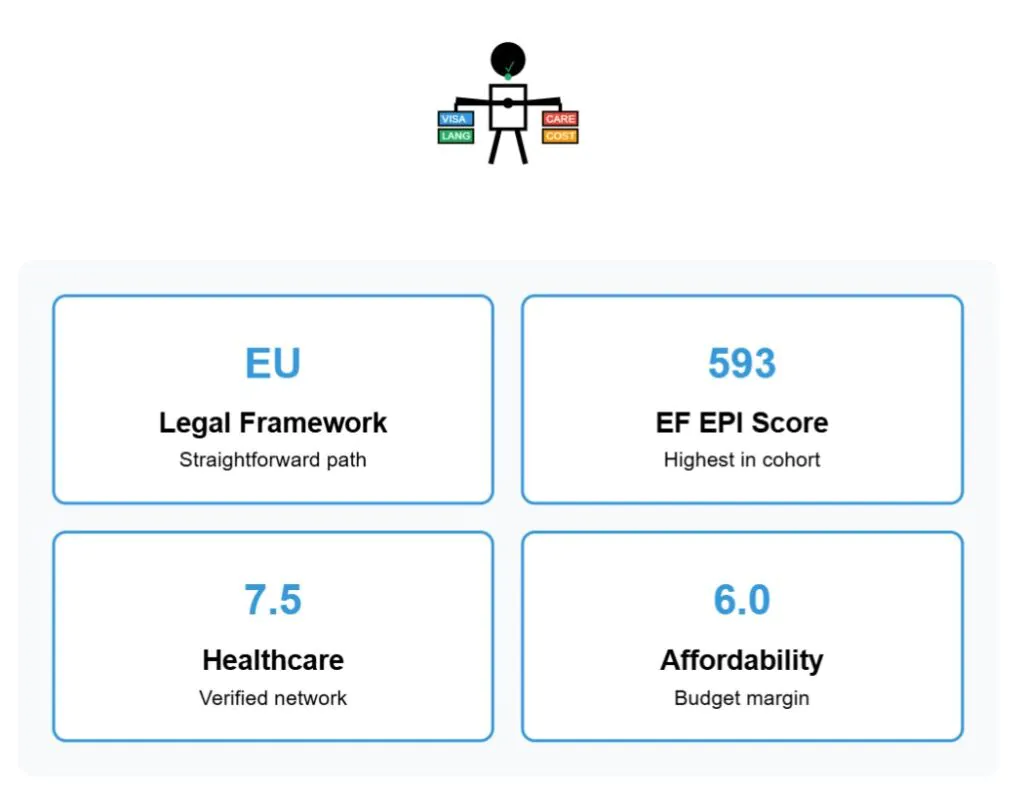
The path for long-term visa is straightforward: a passive income route with moderate means-of-subsistence requirements. It might take some time to process, however, so Romania gets a 6.0 in terms of residency ease.
The Cost of Living Index is 37.5, and the Cost of Living score is 6.0 — Romania is considered by many the second cheapest country in the EU (the first you will discover very soon). Bucharest runs higher than secondary cities, and Cluj-Napoca shows rent pressure as demand grows, but the national baseline stays competitive for retirees.
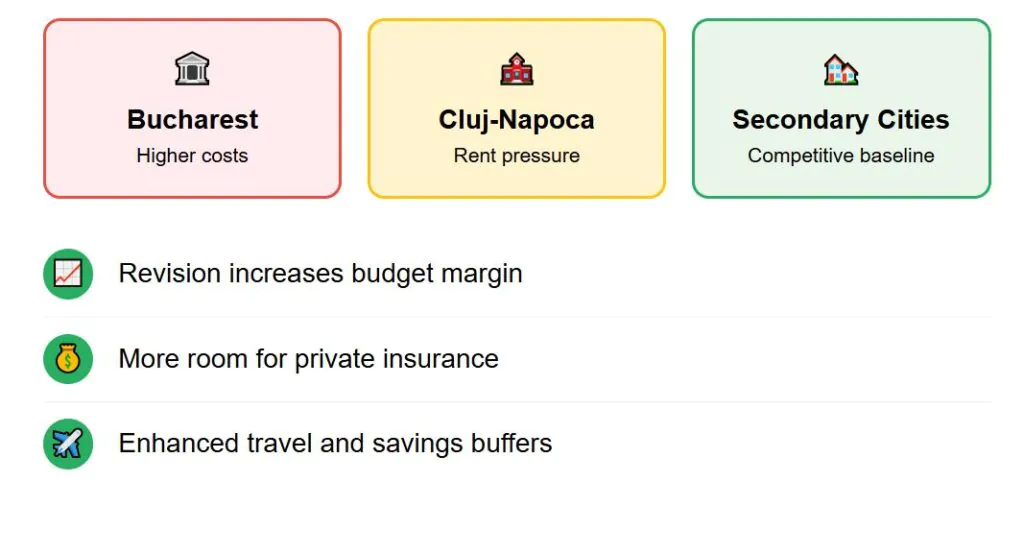
Healthcare is a core strength. Medsana diagnostic centers, part of Athens Medical Group, provide a verified private network. Bucharest also has other institutions with dense access to diagnostics and specialists. The Private Healthcare score of 7.5 reflects this.
Language access is a standout. Romania holds the highest EF EPI in the cohort at 593. The Language score of 9.5 pulls the overall ranking upward because it saves time and money every month. Of course, in small villages there is a big chance that locals will not speak English, but in bigger cities things are different.

We score Infrastructure at 7.5 to capture digital performance and travel access, not just headline speeds. The famous “bad roads full of potholes” of Romania improved, but local roads still lag behind most EU countries.
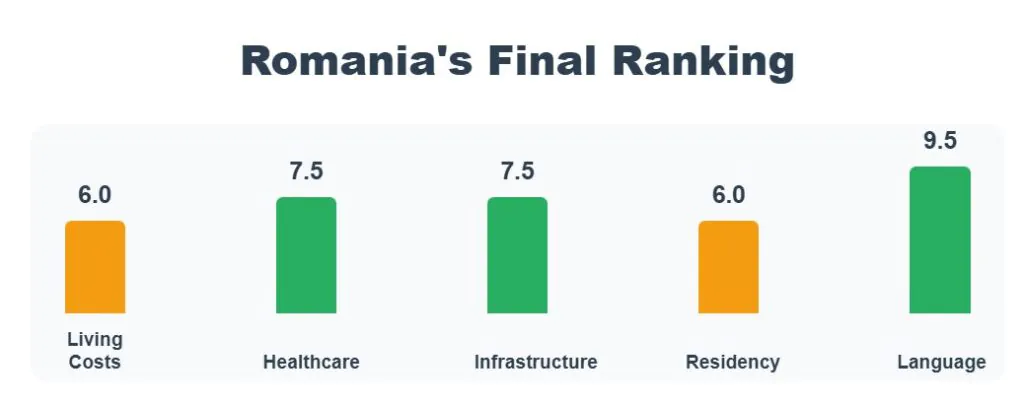
Scores for Romania:
Cost of Living 6.0, Private Healthcare 7.5, Infrastructure 7.5, Residency Ease 6.0, Language 9.5, for a weighted total of 7.30 out of 10.
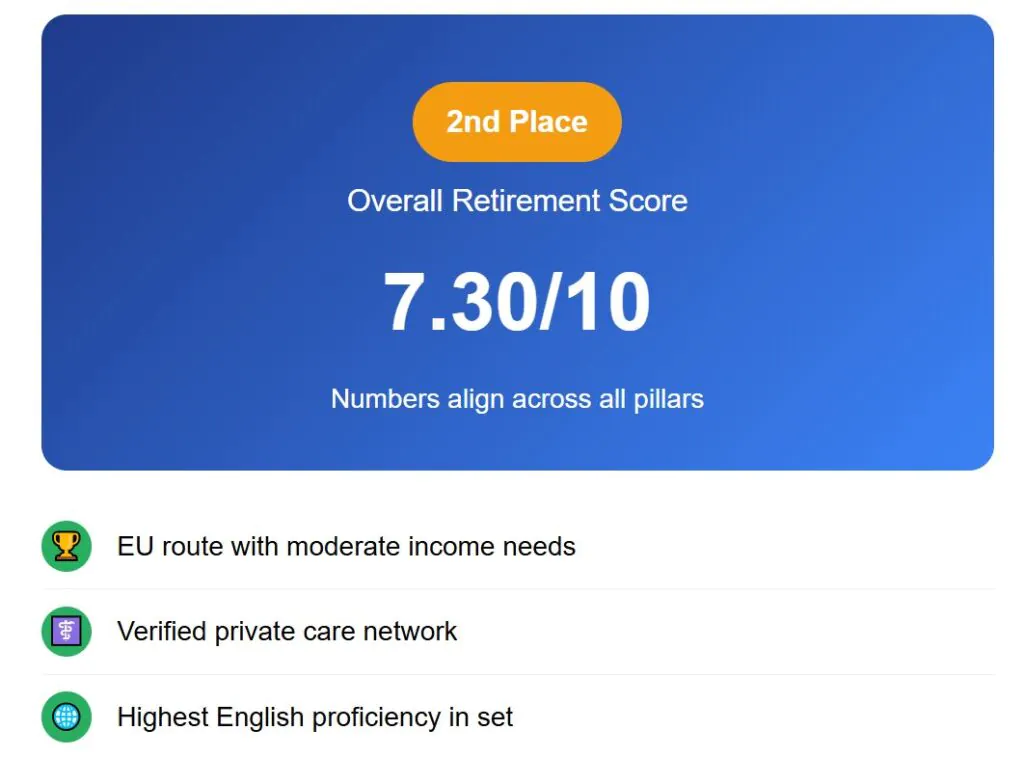
Romania earns second place because it has good cities with relatively low cost of living, and the highest English proficiency in the set.
1st Place: Bulgaria — The Best Country in the Balkans for Expats,
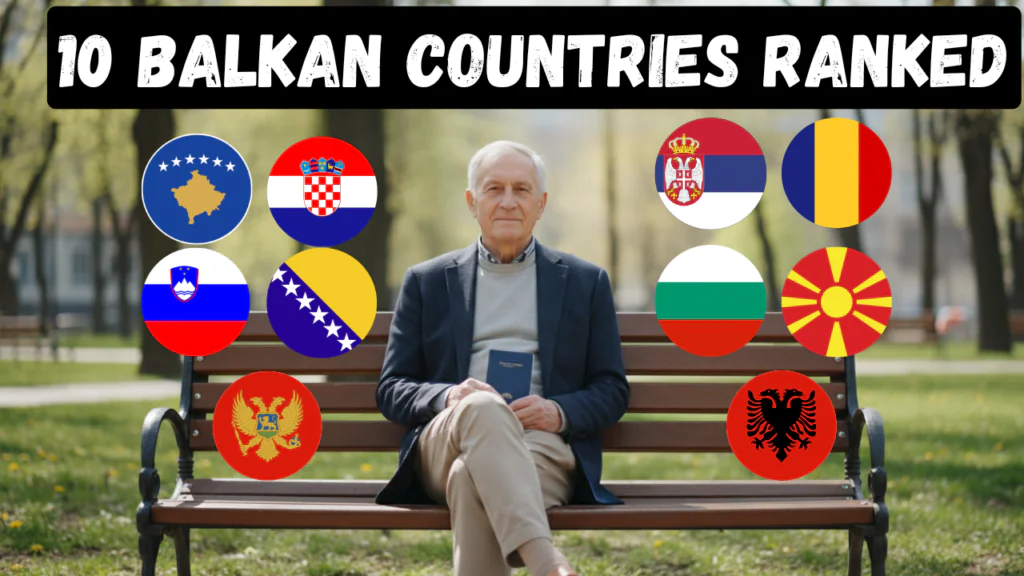
This country wins because residency is simple, costs are low, and daily life works without constant friction.
In Bulgaria, the Pensioner D Visa is a big plus. Prove that you have a pension above the minimum monthly salary — about €477 in 2024 — and apply in person at a Bulgarian embassy. You receive a D visa that leads to temporary residence. That’s a clear, predictable path with a low financial bar, so for residency ease, Bulgaria gets a 10.0.
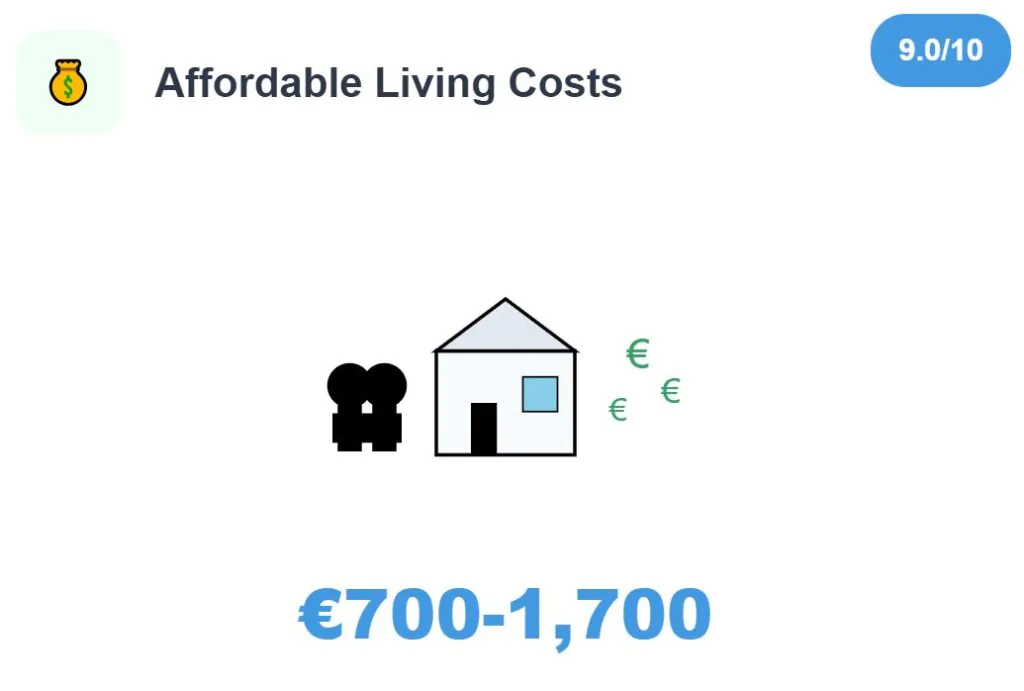
The cost of living is also quite low. A person can live on a monthly budget between €800 and €1,700 depending on location. Two-bedroom rentals in nice cities like Burgas can easily be found for less than €500. Other smaller towns have even lower prices.
Bulgaria is also very well connected via air — not only Sofia, but also Varna and Burgas have year‑round routes to EU hubs. Infrastructure earns a 9.0 because of the very well-connected airports and good internet.
In terms of language access, Bulgaria’s EF EPI score is 586. The number of people who can speak English in larger cities is surprisingly high. So many daily tasks are “solvable,” since you find people who understand at least basic English.
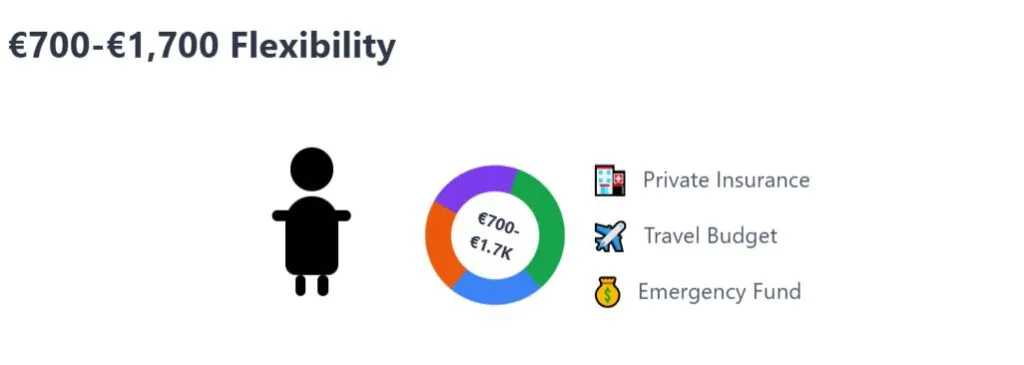
Healthcare works as a blended plan. The private network is not the strongest, but the costs are low, and it covers most use cases for retirees who plan routine diagnostics and scheduled procedures.
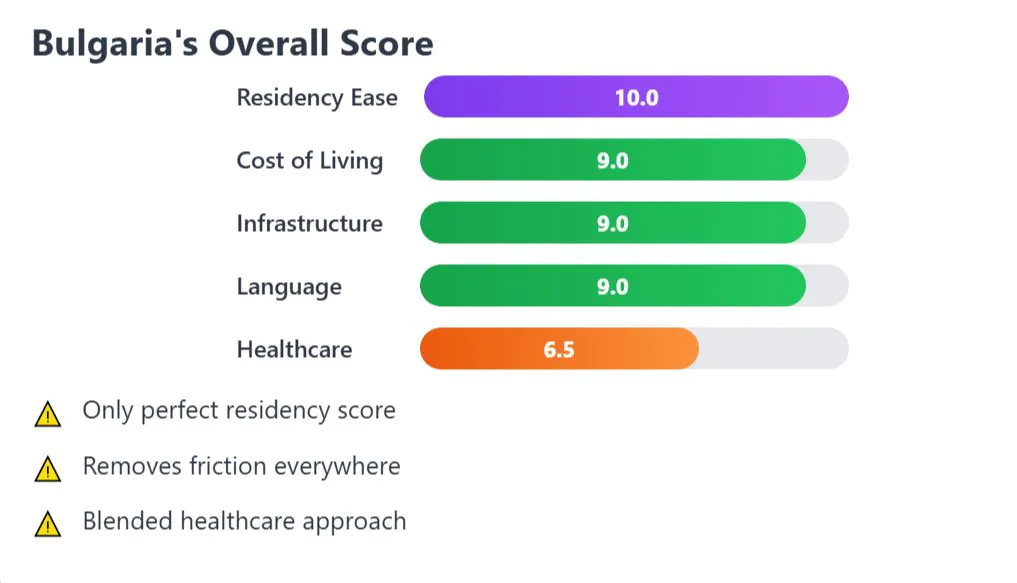
Scores for Bulgaria:
Cost of Living 9.0, Private Healthcare 6.5, Infrastructure 9.0, Residency Ease 10.0, Language 9.0. That 10.0 for residency is the only perfect score in the entire ranking, and it is why Bulgaria stands at the top.
The weighted total is 8.70 out of 10.
In fact, Bulgaria is one of the four countries where I would live on US$1,000 or less.
Levi Borba is the founder of expatriateconsultancy.com, creator of the channel The Expat, and best-selling author. You can find him on X here. Some of the links above might be affiliated links, meaning the author earns a small commission if you make a purchase.
